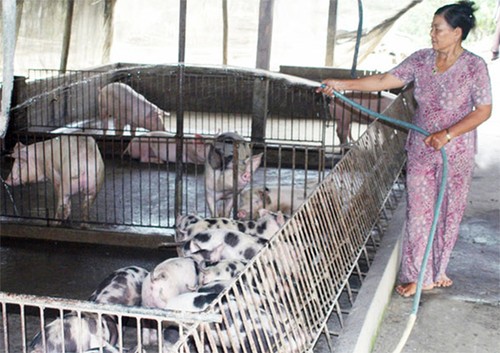(VOVworld) – With the biggest natural land area in the Mekong Delta province of Kien Giang, Hon Dat district is home to Kinh, Khmer, and Chinese ethnic groups. During the national resistance war, Hon Dat was famous for its revolutionary tradition and as the native land of sister Su, the main character of a novel by writer Anh Duc. Women in the district and the local Women’s Association have worked together for poverty reduction and economic development.
 |
| Raising pigs has helped many women and their families escape poverty. |
Located at the foot of Hon Soc Mountain, Hon Soc hamlet has an unfavorable terrain for farming. Neang Huong, vice chairwoman of Tho Son commune’s Women’s Association, recalls the past when locals depended on offshore fishing and stone quarrying.
Ms. Huong said that they “had no farmland and couldn’t make any profit from growing crops. Most villagers were hired labor. Men mainly worked as stone porters or rock drillers. Three years ago, local women were mostly involved in carrying rocks. The work was extremely hard.”
Hon Soc hamlet has 355 women. Some of them go far from home to find jobs. The rest are mostly old or weak people who can’t work.
In such conditions, the hamlet’s women’s association offers bank loans at low interest rates to help people start businesses. Each household is loaned up to 220 USD for 18 months at an interest rate of 1% a month.
Thi Cao who borrowed 180 USD, bought a pair of pigs. She has made about 140 USD in profits. This has helped Ms. Cao’s family pay the school fees for one of their sons.
She said “the loan helped us buy two pigs. I sold them and bought another pair. The first time, I raised 6 pigs, but this time only 2 pigs due to weather change. But I also raise fowls, two flocks of chickens and two flocks of ducks. Although the state has given us financial support, it was too little. That’s why I only breed poultry.”
Like Cao’s household, Thi Phang is disadvantaged. Her husband died young, Phang has 5 children who don’t have stable jobs but work as porter or grow vegetables to earn a little money.
“As soon as I got the association’s loan of 180 USD, I bought 3 pigs. In the past, we were very poor. Thanks to the association’s support, our living standards has somewhat improved,” Ms. Phang said.
Several households have failed to use the loans effectively. With the same amount of funding, Thi Nguyet bought 50 chickens, all of which died due to extremely cold weather. Now Nguyet stays at home to prepare meals for the family in the morning and loads rocks in the afternoon to pay off the bank loan.
Neang Huong, vice chairwoman of Tho Son commune’s Women’s Association, said borrowers are taught the basic skills needed to raise poultry and use the loans effectively.
Ms. Huong said “after they are given loans, I visit them to see how their business is doing and whether find out or not they are following the training. We’ve organized training courses on poultry breeding and on how to make enough money to pay off state loans. If even one member of the group can’t pay on time, it will be a headache for everyone, so I have to help them if I can.”
Giving women low-interest loans is Hon Dat district’s way to help them achieve a better life. But it’s just the first step. Further assistance is needed from local administrations, agencies, sectors, and organizations.